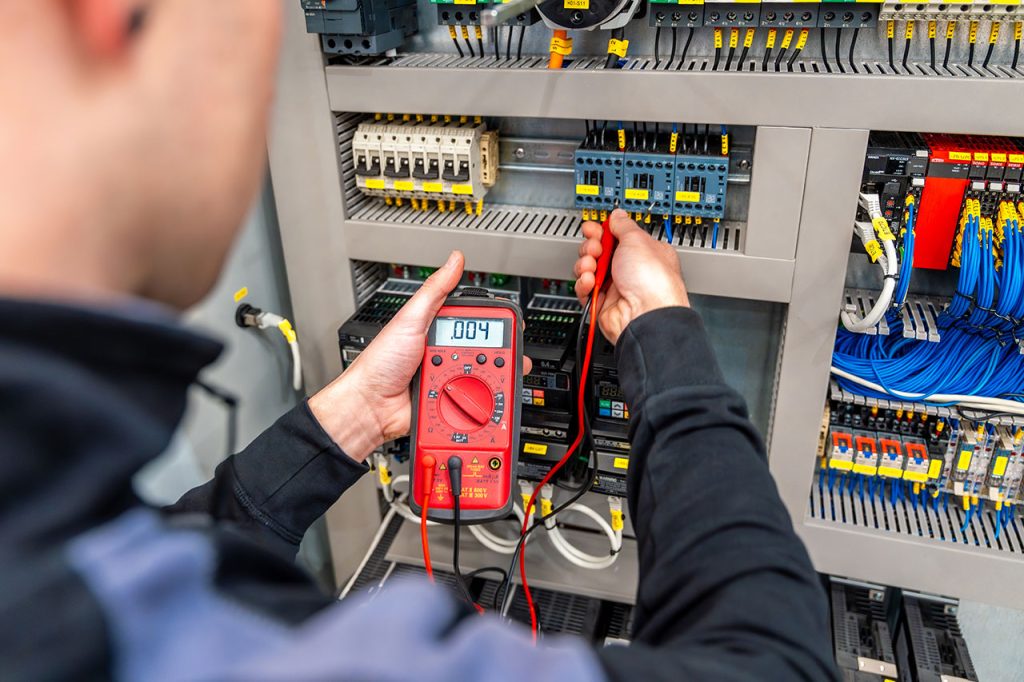ELECTRICAL

In the world of modern construction, structural integrity and architectural brilliance are only part of the equation. What truly brings a building to life—and keeps it functioning seamlessly—is its MEP system: Mechanical, Electrical, and Plumbing. These three critical disciplines form the heart of any building’s infrastructure, ensuring comfort, safety, and efficiency for occupants.
At Al Hadeel International, we understand that MEP isn’t just a behind-the-scenes component—it’s a fundamental pillar of smart, sustainable construction.
What is MEP?
MEP stands for Mechanical, Electrical, and Plumbing—three key systems that are essential for the day-to-day operation of any residential, commercial, or industrial building.
Mechanical Systems: Primarily refers to HVAC (Heating, Ventilation, and Air Conditioning), which regulates indoor temperature and air quality.
Electrical Systems: Covers all aspects of power distribution, lighting, backup systems, earthing, and more.
Plumbing Systems: Includes water supply, drainage, sewage, and often, fire suppression piping.
Each system is interdependent and must be carefully designed and integrated into the construction process to ensure the building functions effectively and efficiently.
Why is MEP So Crucial in Today’s Projects?
1. Comfort and Livability
Without HVAC, power, and water systems, even the most aesthetically stunning buildings would be uninhabitable. MEP ensures buildings are climate-controlled, well-lit, and supplied with clean water—all vital for comfort and productivity.
2. Energy Efficiency
Modern MEP systems are designed with energy conservation in mind. Efficient HVAC units, LED lighting, automated controls, and water-saving plumbing fixtures can drastically reduce operational costs and environmental impact.
3. Fire Safety and Protection
MEP includes fire alarm systems, sprinklers, smoke extraction, and emergency lighting—all critical for occupant safety and required by Civil Defense codes.
4. Operational Performance
MEP systems are responsible for the day-to-day functionality of a building. From elevators and water heaters to data cabling and ventilation, these systems must work harmoniously for smooth operations.
5. Cost Efficiency
Proper MEP planning reduces costly reworks, downtime, and energy wastage. Integrated design and execution by experienced contractors like Al Hadeel International lead to long-term savings.
MEP in the Age of Smart Buildings
As the UAE and the wider GCC region move towards smart cities and intelligent buildings, MEP systems have become even more advanced. Integration with Building Management Systems (BMS), IoT devices, and automation platforms allows real-time monitoring, fault detection, and efficient system management.
The Importance of Choosing the Right MEP Contractor
An experienced MEP contractor ensures:
Compliance with UAE regulations and international standards
Coordination with architects, civil engineers, and interior designers
Use of high-quality materials and approved brands
Timely project completion and robust after-sales support
At Al Hadeel International, we provide end-to-end MEP services—from design and engineering to installation, testing, and maintenance. Our focus is on delivering systems that are technically sound, code-compliant, and future-ready.
Conclusion
MEP systems are no longer an afterthought—they are at the core of sustainable, efficient, and safe buildings. As construction becomes more complex and technology-driven, the role of MEP will only continue to grow in importance.
If you’re planning a new development or upgrading an existing facility, ensure you partner with an MEP expert who brings knowledge, precision, and integrity to the table.
Latest Post
-
08 Jul 2025 ConstructionA Deep Dive into Villa Construction in the UAE
-
08 Jul 2025 ELV SystemsWhy Fire Alarm and Fire Fighting Systems Are Non-Negotiable in the UAE
-
08 Jul 2025 ElectricalUnderstanding HVAC Systems: What Every Property Owner Should Know
-
08 Jul 2025 ElectricalThe Role of MEP in Modern Construction Projects

